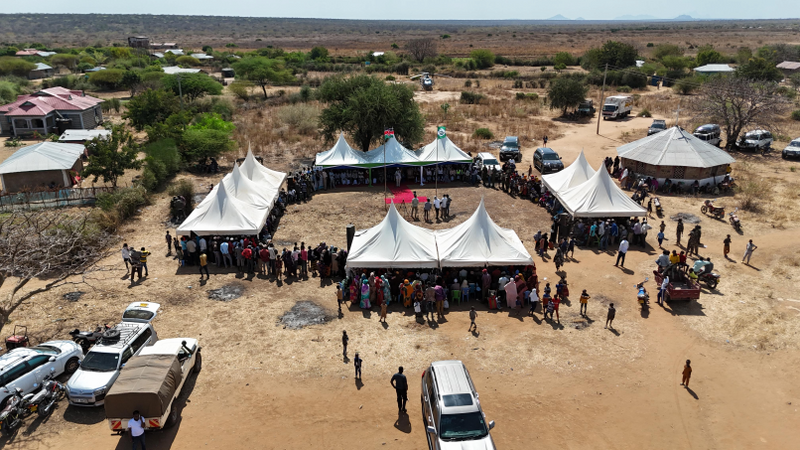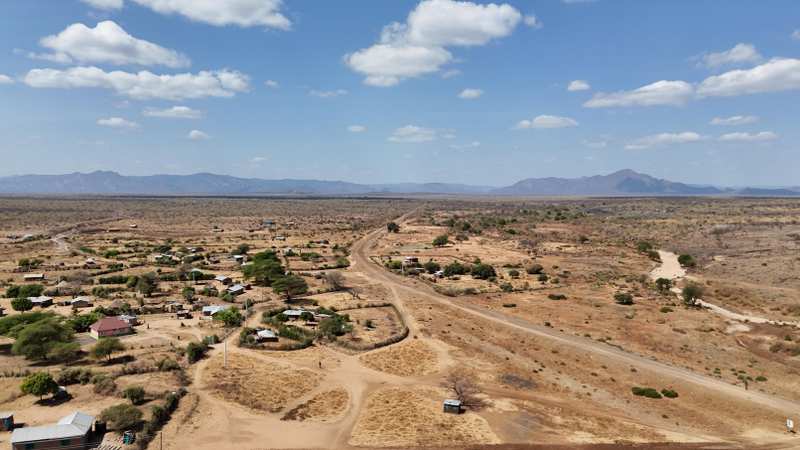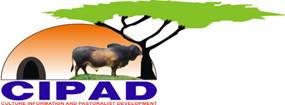Ieri a Walda e a Sololo è stato presentato (“Feedlot/Hay Fam”)
PROGETTO DI SVILUPPO AGRO-PASTORALE INTEGRATO sponsorizzato dal governo.
Il pensiero di pino
Mi fa piacere sottolineare come Cipad con il suo Progetto Sololo si trovi allineato con l’attuale politica governativa di sviluppo agro-pastorale integrato.
Cipad nasce nel 2004 applicando il Children act allora ancora in via di approvazione da parte del governo che lo approverà definitivamente il 6 luglio 2022.
Cipad conduce attività sperimentale nella sua area agricola, creata nel 2012, per integrare la dieta a base di mais dei minori e con la speranza che l’agricoltura possa divenire integrativa, se non sostitutiva nel futuro, alla tradizionale pastorizia nomadica.
Da anni Cipad sta sperimentando nel proprio compound la trasformazione della pastorizia nomadica in allevamento stanziale, con un numero limitato, ma calcolato in base all’area disponibile, di animali domestici: mucche, bue, asini …. Allevamento stanziale a livello familiare; non intensivo.
Cipad dal 2020 ha fatto richiesta agli uffici governativi della contea di attivare nell’Obbitu Village un “Rescue Center” governativo. (Il documento presentato a maggio 2020). La delicatezza dei problemi e la professionalità richiesta per affrontare e gestire questo progetto, non può prescindere dall’apporto in partenariato del governo.
Grazie a Cipad per la lungimiranza dimostrata

Ecco il discorso del governatore, con il segretario principale di ASAL (Terre aride e semiaride) che è di Sololo. Durante il lancio del PROGETTO DI SVILUPPO AGRO-PASTORALE INTEGRATO DI WALDA, CONTEA DI MARSABIT.
Sono molto onorato di unirmi a voi oggi mentre assistiamo al lancio di uno dei progetti più impattanti nella storia del settore zootecnico di Marsabit.
Mentre nel corso degli anni abbiamo avuto una serie di progetti nel settore zootecnico, il progetto che stiamo lanciando oggi è, non solo il primo del suo genere, ma anche uno che promette un cambiamento di paradigma nello sviluppo del settore zootecnico della nostra contea.
Sono molto grato al Ministero nazionale di ASAL e sviluppo regionale e all’Autorità per lo sviluppo di Ewaso Ng’iro per la selezione di Marsabit come contea di implementazione. Questo progetto è particolarmente importante per noi, soprattutto in vista delle sfide eccezionali che la pastorizia deve affrontare a Marsabit e, cosa ancora più importante, dei cambiamenti nelle condizioni climatiche che affliggono l’economia del bestiame.
Non ho bisogno di sottolineare che la pastorizia è un’opzione di sostentamento fondamentale da cui trae sostentamento oltre l’80% della nostra popolazione.
Purtroppo, in tutto il mondo e in particolare in Kenya, i pastori costituiscono un gruppo sociale che è meno apprezzato e meno supportato dai governi e dalle politiche governative.
Nonostante le prove empiriche a sostegno della pastorizia come un’opzione di sostentamento praticabile, adatta alle terre aride e semi-aride come Marsabit, i governi non hanno accordato alla pastorizia un sostegno significativo, sia nelle politiche che nella pratica.
Poi sono arrivati i cambiamenti nelle condizioni climatiche che hanno reso la situazione ancora peggiore per le comunità già vulnerabili le cui vite e i cui mezzi di sostentamento dipendevano dall’ambiente e dalle risorse naturali. Sebbene il cambiamento climatico sia effettivamente considerato una delle sfide globali più gravi del nostro tempo, è la minaccia più grande all’esistenza dei pastori.
Poi c’è il problema della rapida urbanizzazione e dell’aumento della popolazione umana, entrambi con un impatto negativo sulla pastorizia.
Negli ultimi 40 anni, il numero di persone nelle contee ASAL è aumentato di cinque volte, ma la quantità di pioggia che riceviamo è diminuita ogni anno; le condizioni di siccità sono aumentate in gravità e frequenza e la temperatura è aumentata.
Immagina questo:
La popolazione di Marsabit nel 1980 era di circa 100.000 persone insediate su un’area di circa 45 ettari.
Oggi, la popolazione di Marsabit è cresciuta di 6 volte, raggiungendo circa 600.000 persone. Il territorio insediato dall’uomo è aumentato da 45 ettari nel 1980 a oltre 400.000 ettari oggi. Di nuovo nel 1980, circa 2,8 milioni di ettari di terraferma di Marsabit erano coperti di vegetazione.
Oggi, la terra coperta da piante si è ridotta di oltre 1,2 milioni di ettari.
In poche parole, mentre il numero di persone a Marsabit è aumentato di 6 volte negli ultimi 40 anni, la copertura vegetale della contea si è ridotta di quasi il 50%.
Inoltre, le specie vegetali importanti per il bestiame sono scomparse e ovunque crescono piante invasive sgradevoli al bestiame.
Questi cambiamenti hanno avuto un impatto così negativo sia sulla produttività dei pascoli che sulla disponibilità di acqua, con conseguenti massicce riduzioni del bestiame di oltre l’80%.
La domanda a cui dobbiamo trovare risposta non riguarda più l’impatto del cambiamento climatico sulle nostre terre, sulle nostre vite o sull’economia del bestiame.
La vera e urgente domanda è cosa dovremmo fare per salvare le vite e i mezzi di sostentamento dei pastori dai capricci del cambiamento climatico. Per rispondere a questa domanda e andare avanti, dobbiamo ammettere qui e ora che la pastorizia come la conoscevamo prima non è più un’opzione per un futuro sostenibile e sicuro dal punto di vista alimentare nelle ASAL del Kenya.
Dobbiamo accettare che adattare un nuovo approccio all’allevamento del bestiame è un imperativo economico e ambientale.
Sono molto emozionato che l’azione che stiamo commissionando oggi parli di questo imperativo.
Questo progetto è una soluzione perfetta per la promozione del benessere economico a lungo termine dei pastori.
Questo progetto si distingue come un modo innovativo per rompere i cicli intergenerazionali e multidimensionali della povertà.
È la soluzione di cui avevamo bisogno per mitigare la vulnerabilità di lunga data dei pastori agli shock climatici.
Sono molto convinto che le attività proposte da questo progetto aiuteranno a riparare i danni già arrecati alle nostre risorse di pascolo, contribuiranno al ripristino e al miglioramento dell’ecosistema ecologico di Marsabit.
Questa azione potrebbe essere l’arma potente di cui avevamo bisogno per combattere contro il cambiamento climatico e il suo effetto devastante sulla pastorizia.
L’obiettivo principale di questo progetto è l’istituzione di un feedlot all’avanguardia in cui saranno allevati circa 2.000 capi di bestiame. Il vantaggio del sistema feedlot è che il bestiame sarà tenuto, nutrito e ingrassato in un’area confinata, al contrario della pastorizia itinerante in cui ci siamo impegnati per secoli.
Oltre all’istituzione del feedlot, Marsabit trarrà vantaggio anche dalla costruzione di una mega diga con una capacità di 1,2 milioni di metri cubi di acqua.
Inoltre, cinque pozzi saranno perforati e attrezzati attraverso questo progetto; 1.000 acri di terreno saranno destinati alla produzione di mangimi per bestiame, il che si traduce approssimativamente in 50.000 tonnellate di foraggio prodotte annualmente.
Il progetto intende anche piantare e far crescere circa 2 milioni di alberi nel corso della sua durata, mentre 1.000 persone a Marsabit saranno formate su un sistema di produzione di bestiame innovativo e sostenibile.
Non c’è dubbio che questo progetto sarà un vero punto di svolta se implementato come progettato.
Chiedo al Ministero, all’Autorità per lo sviluppo di Ewaso Ng’iro e allo staff del progetto che l’implementazione di questo progetto e le attività proposte procedano come progettato.
Vi do il mio impegno e quello della mia amministrazione affinché ogni supporto necessario per il successo di questo progetto venga fornito come e quando necessario.
Ho già incaricato il Department of Livestock e il Governor’s Delivery Team di lavorare in modo collaborativo per e verso il successo di questo progetto.
Esprimo ancora una volta il mio orgoglio e la mia lode allo State of Department of ASAL e all’Ewaso Ng’iro Development Authority per aver dimostrato vera leadership, cura e gli interventi più necessari per gli ASAL del Kenya.
Non ho dubbi che insieme possiamo trasformare le numerose sfide associate agli ASAL in opportunità per il Kenya.
E Mohamud M. Ali, EGH,
Governatore, Contea di Marsabit

Yesterday at Walda in Sololo.feedlot/Hay Fam for Government sponsored project was launched.here is the speech by the governor with principle secretary of ASAL who is also from Sololo.
Pino’s Thought
I am pleased to point out that Cipad with its Sololo Project is perfectly aligned with the current government policy of integrated agro-pastoral development.
Cipad was born in 2004 by applying the Children Act, which was still being approved by the government and will finally approve it on July 6, 2022.
Cipad conducts experimental activities in its agricultural area, created in 2012, to integrate the corn-based diet of minors and with the hope that agriculture can become complementary, if not a replacement in the future, to traditional nomadic pastoralism.
For years, Cipad has been experimenting in its compound with the transformation of nomadic pastoralism into sedentary breeding, with a limited number of domestic animals, but calculated based on the available area: cows, oxen, donkeys …. Sedentary breeding at family level; non-intensive.
Since 2020, Cipad has requested the county government offices to activate a government “Rescue Center” in Obbitu Village. (The document presented in May 2020). The delicacy of the problems and the professionalism required to address and manage this project cannot ignore the government’s partnership contribution.
Thanks to Cipad for the foresight shown




